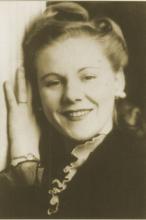Viola Liuzzo
The Viola Liuzzo Story
Some historians believe that Viola Liuzzo is the only white woman to have been martyred for supporting voting rights. Uncommon Courage: The Viola Liuzzo Story features interviews with Mary Stanton, Pulitzer-nominated author of From Selma to Sorrow: The Life and Death of Viola Liuzzo; Leroy Moton, the black man who was riding in the car with Mrs. Liuzzo when she was murdered; Pulitzer-prize winning historian Taylor Branch; Dr. Frederick Reese, a pastor, civil rights activist and educator who lives in Selma; and other experts and observers of the Selma experience. The audio documentary aims to explain who Mrs. Liuzzo was, what motivated her to go to Selma, what her efforts meant to the civil rights and women's rights movements, and how her death impacted both movements.
Originally commissioned by WLRH-FM in Huntsville, Ala., Uncommon Courage: The Viola Liuzzo Story will be distributed by Public Radio International to many of its 700-plus affiliates in 2003 as a part of its Black History Month programs.
Mary Stanton is a public administrator for the Town of Mamaroneck, New York. She has taught at the University of Idaho, the College of St. Elizabeth in New Jersey, and at Rutgers University. Her work has appeared in Southern Exposure, Gulf South Historical Review and Government Executive. She is currently working on a biography of Juliette Morgan, a white librarian who became involved in the 1955 Montgomery Bus Boycott.
For profiles of interracial activism in Alabama check out:
From Selma To Sorrow: The Life and Death of Viola Liuzzo, by Mary Stanton, published by the University of Georgia Press. This is the first full-length biography to examine the controversial life, murder, and subsequent character assassination of a white Detroit housewife who was murdered by the Klan during the 1965 Selma Voting Rights March. Almost forty years after her murder she remains an enigma. For some Viola Liuzzo became a martyr while others still believe "she got what she deserved." On March 25, 1965, Liuzzo and Leroy Moton, a young black man, were on their way from Selma to Montgomery after the March. Four Klansmen followed Liuzzo's car along Highway 80 for twenty miles then pulled alongside it and fired shots. Liuzzo was killed instantly. Moton, covered with her blood, escaped by pretending to be dead. Because this group of Klansmen included an FBI informant Liuzzo lost her life in more ways than one. To deflect attention and to cover up his recklessness in permitting a known violent racist to work undercover during the Voting Rights March J. Edgar Hoover crafted a malicious public relations campaign that unfairly portrayed Viola Liuzzo as an unstable women who had abandoned her husband and five children to stir up trouble in the South. For more information visit the University of Georgia Press website at www.uga.edu or call 1-800-266-5842.
Freedom Walk: Mississippi or Bust, by Mary Stanton, published by the University Press of Mississippi chronicles the events of the tumultuous summer of 1963 just before Birmingham, Alabama exploded. Bill Moore, a white peace activist who made his living as a mailman tried to make a one-man assault on racial injustice. His well-publicized purpose was to walk from Chattanooga, Tennessee to Jackson, Mississippi to hand deliver a plea for racial tolerance to Ross Barnett, the staunchly segregationist governor of Mississippi. Moore kept a journal of his walk, and using it along with interviews and extensive newspaper and newsreel reports Stanton has documented this phenomenal freedom walk as seen through Moore's eyes.
On April 23, 1963 Bill Moore was shot dead on a highway near Attalla, Alabama. Floyd Simpson, a grocer and a member of the Gadsden Ku Klux Klan was charged with the murder. A week later a white college student named Sam Shirah led five black and five white volunteers into Alabama to finish Moore's walk. They were beaten and jailed. Four other attempts to complete the postman̢۪s deliver were similarly stymied. Freedom Walk tells the complicated, interwoven stories of Moore, Shirah, and Simpson. Though all three shared a deep love of the South, their strong feelings about who was entitled to walk its highways were in deadly conflict. For more information visit the University Press of Mississippi website at www.upress.state.ms.us or call1-800-737-7788.

